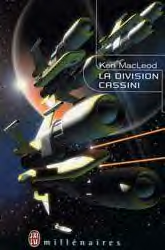Hey, this is Europe. We took it from nobody; we won it from
the bare soil that the ice left. The bones of our ancestors, and the
stones of their works, are everywhere. Our liberties were won in
wars and revolutions so terrible that we do not fear our governors:
they fear us. Our children giggle and eat ice cream in the palaces
of past rulers. We snap our fingers at kings. We laugh at popes.
When we have built up tyrants, we have brought them down.
And we have nuclear fucking weapons.
– Ken MacLeod
Geoff Plauché’s recent post on John Wright’s “Golden Age” trilogy (see also my review from a few years back) reminded me that I’ve never gotten around to blogging about Ken MacLeod’s “Fall Revolution” series.
 Despite rather different political sensibilities, MacLeod’s and Wright’s series share some similarities. Like the “Golden Age” trilogy, the “Fall Revolution” tetralogy focuses on conflicts between different varieties of libertarians, not just between libertarians and statists. MacLeod also shares Wright’s zest for injokes; MacLeod’s books are filled with sly references for libertarians, leftists, science-fiction fans, and even philosophers to pick up on. (His chapter titles, for example, include “The Machinery of Freedom,” “To Each As He Is Chosen,” “The Summer Soldier,” “The Court of the Fifth Quarter,” “Looking Backward,” “News From Nowhere,” “The Coming Race,” “Vast and Cool,” “In the Days of the Comet,” “Another Crack at Immanentizing the Eschaton,” and “What I Do When They Shove Chinese Writing Under the Door.”)
Despite rather different political sensibilities, MacLeod’s and Wright’s series share some similarities. Like the “Golden Age” trilogy, the “Fall Revolution” tetralogy focuses on conflicts between different varieties of libertarians, not just between libertarians and statists. MacLeod also shares Wright’s zest for injokes; MacLeod’s books are filled with sly references for libertarians, leftists, science-fiction fans, and even philosophers to pick up on. (His chapter titles, for example, include “The Machinery of Freedom,” “To Each As He Is Chosen,” “The Summer Soldier,” “The Court of the Fifth Quarter,” “Looking Backward,” “News From Nowhere,” “The Coming Race,” “Vast and Cool,” “In the Days of the Comet,” “Another Crack at Immanentizing the Eschaton,” and “What I Do When They Shove Chinese Writing Under the Door.”)
The “Fall Revolution” comprises four interlocking books – The Star Fraction, The Stone Canal, The Cassini Division, and The Sky Road – that cut back and forth across vast swathes of future history, from the pubs of 1970s Glasgow to farflung planetary colonies centuries hence – though thanks to life-extension technology the same characters keep showing up in all the different eras, with minor characters in some of the books showing up as major characters in others.
 But what is most distinctive about the characters is their dizzying varieties of antistate radicalism: MacLeod gives us anarcho-capitalists, anarcho-primitivists, Tuckerite mutualists, Stirnerite anarcho-communists, and even market-friendly Trotskyists (not an oxymoron in MacLeod’s universe), all arguing with or scheming against each other, loving, fighting, and mourning each other, against the backdrop of wars, revolutions, and social upheavals in which they play their parts. MacLeod mostly doesn’t take sides or play favourites, and indeed seems to relish his wrangling protagonists in all their ideological diversity (well, except he doesn’t much like the primitivists). For example, an encounter between a sort-of-anarcho-capitalist society and a sort-of-anarcho-communist society in The Cassini Division highlights the strengths and flaws of each. (Austrians who’re wondering how the anarcho-communist society solves the calculation problem will find the answer, however unsatisfactory, in The Sky Road.) MacLeod isn’t pushing One Big Answer here; on the contrary, each entry in the series subtly deconstructs the central assumptions of the previous one.
But what is most distinctive about the characters is their dizzying varieties of antistate radicalism: MacLeod gives us anarcho-capitalists, anarcho-primitivists, Tuckerite mutualists, Stirnerite anarcho-communists, and even market-friendly Trotskyists (not an oxymoron in MacLeod’s universe), all arguing with or scheming against each other, loving, fighting, and mourning each other, against the backdrop of wars, revolutions, and social upheavals in which they play their parts. MacLeod mostly doesn’t take sides or play favourites, and indeed seems to relish his wrangling protagonists in all their ideological diversity (well, except he doesn’t much like the primitivists). For example, an encounter between a sort-of-anarcho-capitalist society and a sort-of-anarcho-communist society in The Cassini Division highlights the strengths and flaws of each. (Austrians who’re wondering how the anarcho-communist society solves the calculation problem will find the answer, however unsatisfactory, in The Sky Road.) MacLeod isn’t pushing One Big Answer here; on the contrary, each entry in the series subtly deconstructs the central assumptions of the previous one.
Nevertheless, one character’s speech seems to express MacLeod’s own perspective, broadly speaking:
[W]hat we always meant by socialism wasn’t something you forced on people, it was people organizing themselves as they pleased into co-ops, collectives, communes, unions…. And if socialism really is better, more efficient than capitalism, then it can bloody well compete with capitalism. So we decided, forget all the statist shit and the violence: the best place for socialism is the closest to a free market you can get!
Good reading, comrades!
Okay, I’ve just seen what, if true, is an absolutely insane, over-the-top set of spoilers for Battlestar Galactica’s two-part season finale.